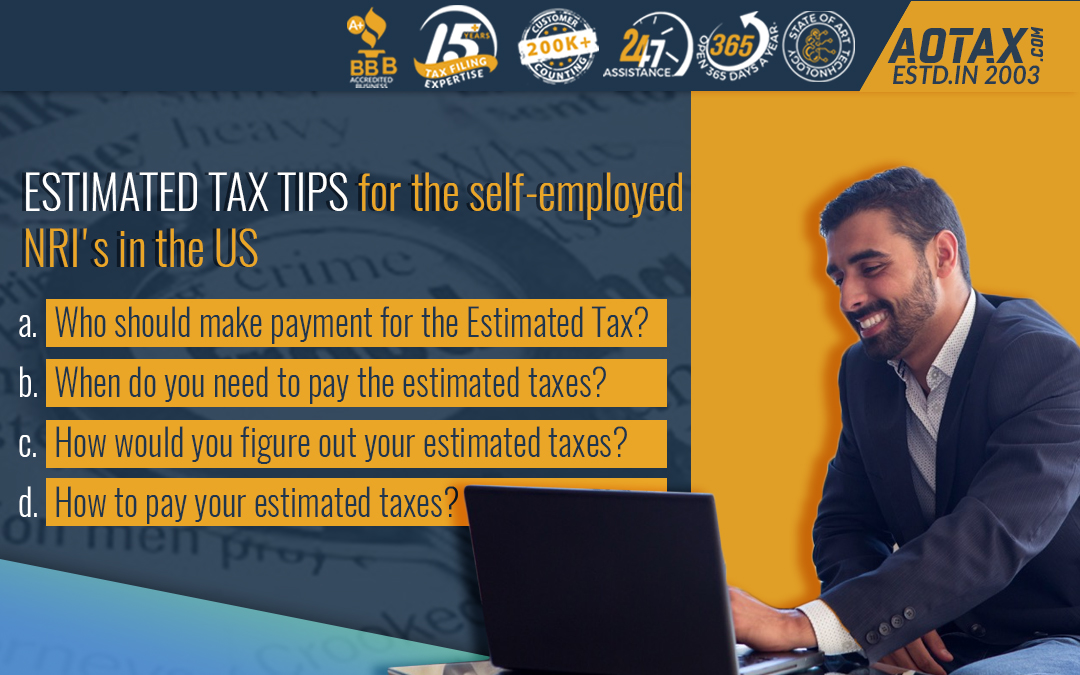Estimated Tax Tips for the self-employed NRI’s in the US
Estimated Tax Tips for the self-employed NRI’s
in the US

If you are self-employed NRIs in the US, you will have to make payment for quarterly estimated taxes. Due to the COVID-19 conditions, the deadline for the first and second quarterly estimated tax payment was extended to 15th July 2020. The deadline for the third quarter estimated tax payment was on 15th September 2020 and the fourth payment deadline is yet to come.
So, you must know about the basic tax tips which are needed by self-employed NRIs in the US for the estimated tax payments.
Who should make payment for the Estimated Tax?
- In the United States, there is a “pay as you go” tax system. This implies that the Government expects that it would receive most of the taxes throughout the year. As a result, employees usually have a certain amount of taxes directly deducted from their paycheck.
- However, if you are self-employed i.e. you are a freelancer, or a home-based entrepreneur then taxes are not being withheld from your paycheck. You would be subject to making the payment for the estimated tax.
- Generally, self-employed NRIs would be expected for making a payment of estimated taxes only if you are expecting to owe $1000 or more for your tax payment in a year.
- In case, you are earning your self-employment income quite unevenly in the year then you would be able to use the Annualised Installment Method at the time of taxation. By this, you can also avoid a penalty for not making the payment of Estimated Taxes every quarter due to uneven income.
When do you need to pay the estimated taxes?
There have been some changes in the deadline for payment of estimated taxes this year due to the onset of COVID-19.
- 1st Quarter payment – 15th July 2020 (Original deadline was 15th April 2020)
- 2nd Quarter payment – 15th July 2020 (Original deadline was 15th June 2020)
- 3rd Quarter payment – 15th September 2020
- 4th Quarter payment – 15th January 2021
In case, if the 15th falls on a weekend then you will have to pay the estimated taxes on the next weekday.
How would you figure out your estimated taxes?
You should use online programs such as QuickBooks Self-Employed which are available for keeping a track of your income, your expenses, and mileage and calculate your estimated taxes for the year. By the online programs, your calculations are done easily thus, finding out your estimated taxes and helping you make the payment on time. Then while annual filing, by the online programs you can very easily export your information of Schedule C into tax filing tools thus, making the procedure easier.
Pro-tip:- For the self-employed NRIs, there is a new sick and family leave tax credit available. This credit is available under the Family First Coronavirus Response Act. In case you are a self-employed NRI and are also impacted by the pandemic, then you are eligible to fund your sick leave and family leave equivalents. This can be done by considering the 2020 tax credits which would be claimed in 2021 and reducing the 2020 quarterly estimated tax payments if you are eligible for those credits. You can estimate your tax credits by online tax credit calculators and thus, reduce your estimated tax payments by the number of credits you must be eligible for.
How to pay your estimated taxes?
Once, you have calculated your estimated tax you must pay them on time. There are several options by which the self-employed NRIs can make their estimated tax payments.
- You can use the Electronic Federal Tax Payment System (EFTPS) for the payment of your estimated taxes. It would help in making instant payment and the EFTPS is also considered to be free.
- QuickBooks Self-Employed online program would also help you in filing your estimated taxes with the IRS. This method is also fast and error-free as you will not have to re-enter the necessary information into your checkbook or the computer system of the IRS.
- Your estimated tax payment can be mailed using the mailing address provided by the IRS in your respective State. Also, you should be careful that your payments are postmarked by the due date for avoiding penalties.
Pro-tip: – You must keep a record of all the estimated tax payments you have done as you will have to enter the information while filing your taxes.
Conclusion
Hence, this information about estimated tax calculation and payment would definitely help you to understand the process better.










Recent Comments